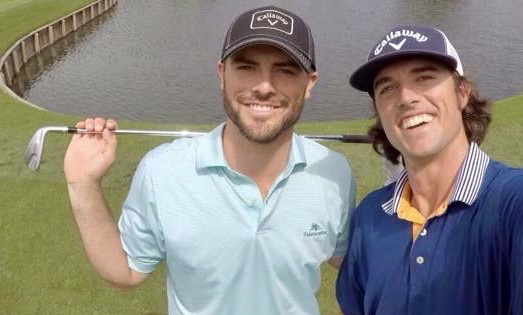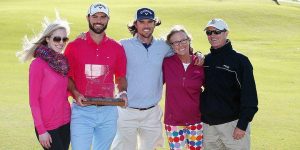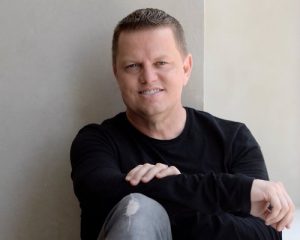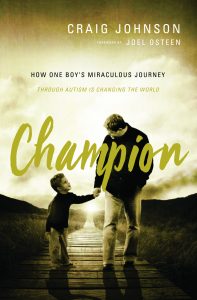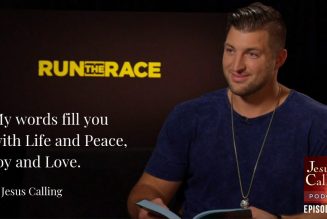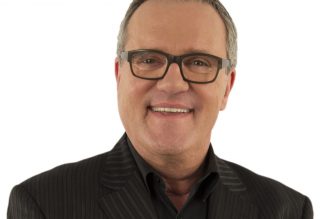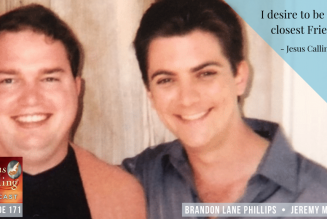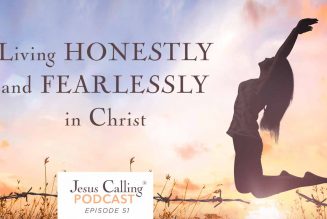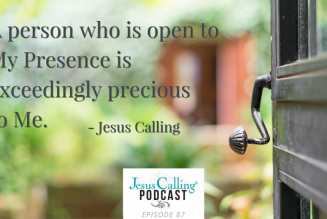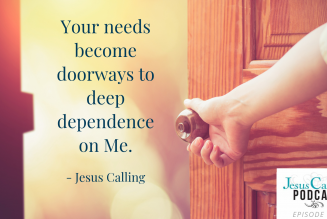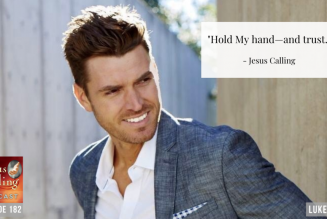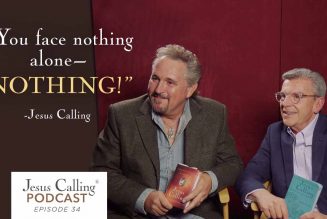Today’s guests feature a pair of brothers who have been pursuing excellence in the world of golf and also pursuing their relationship with God: The Bryan Brothers. Our second guest is Craig Johnson, a minister at Lakewood Church in Houston, Texas. During Autism Awareness Month (April), Craig shares the story about how, when his son was diagnosed with autism, he trusted God’s purpose for his life and was inspired to write a book about that journey called “Champion.”
Christ Is Our Champion: The Bryan Brothers and Craig Johnson – Jesus Calling Podcast Episode #89
Narrator: Welcome to the Jesus Calling Podcast. Today’s guests feature a pair of brothers who have been pursuing excellence in the world of golf: The Bryan Brothers. Our second guest is a minister at Lakewood Church in Houston, Texas. He shares the story about how, when his son was diagnosed with autism, he trusted God’s purpose for his life and was inspired to write a book about that journey called “Champion.” First up, The Bryan Brothers have made a name for themselves as professional golfers who also special in “trick shots.” Their trick shot videos have collectively garnered over 80 million views. Throughout their careers in golf, Wesley and George have stayed grounded in their faith, making time in their busy schedules for prayer and Bible study. They talk about how they got their start and what keeps them motivated to pursue their sport and their relationship with God.
The Family That Golfs Together…
Wesley: I’m Wesley Bryan, a professional golfer. I grew up in Columbia, South Carolina, and attended the University of South Carolina. And I’m a brother to this guy right here.
George: And I’m George Bryan, professional brother and professional golfer. Same as Wesley, I grew up Columbia, went to South Carolina, and here we are.
I can’t remember not having a golf club my hand. Ever since we were probably three or four years old, as we grew up, we went to the range with him where he taught, and we just fell in love with the game and have literally loved it ever since.
Wesley: And we were highly competitive along the way.
We pretty much knew that we were going to be golfers if you just look at our stature it’s not like we really have that much of a chance to go pro in many other sports but we’re always above average in everything that we picked up, sport wise, and just so happened that golf was the most advanced or most skilled. So that’s the pathway, and it definitely helped bring our entire family together. My sister grew up playing golf. My dad was a golf pro and my mom was really, really good at watching golf. So, it made for a really fun family environment as well as keeping extremely competitive.
The Brothers Find Their Faith
Wesley: We grew up in the Episcopal Church, and as a kid sitting in those services, my attention span was not the greatest. I went through the confirmation process, and I would have told you that I was a Christian, but looking back, once I started getting through high school, I realized that I wasn’t saved. That’s when I realized I needed a relationship with Christ. I just knew who God was. I knew about him, but I didn’t have a relationship.
For me, it was just still a lot of years — a lot of my high school years — just chasing the earthly pleasures. It would be this girl or that girl, or it would be this satisfaction or that one, whether I’m seeking it through golf or through sports or whatever outlet it was.
One of my best buds in the whole world, Josh Twito, just kept pounding the gospel to me every single week, every single year, and after enough of those seasons of running from God, I realized that in my senior year — I started dating who is now my wife in high school and realized at that point — I was tired of all those busted relationships and chasing the wrong things. With Josh’s help, I gave my life to Jesus my senior year of high school and have been following Him ever since.
George: Mine was more in college through my friends, Wesley, and our roommate, Patrick Raida. I’d go to FCA in college all for years but still wasn’t going to church really. But every time I went to FCA, I would feel moved and would love the little services that Jackie Easterby, who was the FCA leader at the time, led. I was like, “Man, this is awesome.” He planted that seed where, like, it took me probably until 2011, like three or four years ago, going to FCA and having friends and Wesley and his friends kept pounding the gospel. They would say, “Hey, man. Come to church with me.” Finally, in 2011, I got saved at New Spring and got baptized about a year later and that’s probably when I started. That’s when I finally would consider myself a Christian. I’d go to church. I would read. I would try to grow spiritually and grow closer to Jesus. There was no one thing where I said, “Hey, I’ve got to get serious about my faith.” It was just like one step after another. I knew what my next step was, but I just never wanted to take it until y I finally got saved in 2011. That’s where I kept consciously growing since then. It’s been about 7 or 8 years ago.
Chasing The Dream of Pro Golfing
Wesley: After college was a whole lot of success on the mini-tours for me.
George: Same here.
Wesley: No, you know, I played good in college, and the next step is to turn pro. I turned pro in the summer 2010. And, honestly, three and a half years playing on the mini tours, I had minimal success at best. I had a couple of good finishes and a couple of three- or four- month stretches where I competed and played well, but overall, I played good enough to lose all my money and my funding in about three and a half years. It just didn’t pan out.
My senior year, I’m like, “Okay, I’m going to turn pro. I’ll spend maybe on year on the Web.com Tour and then the PGA Tour. That’s the trajectory that I’m going to be on. I know I can do that.” It didn’t happen like that, and I was like “Man. Like, what? Like, dang it.” But at the same time, this is golf. Golf is hard. So i’ve been 3 1/2 years there, and I’m still chasing. Now I’m on the Latin America Tour and the PGA Tour Canada, I’ll be doing that this summer. So I’m finally — 6 or 7 years — starting to progress back up towards where I know I can be.
George: The mini tour is basically a pay-for-play tour. Everyone puts in X amount of dollars, and the winner’s purse comes from those collective entry fees. It’s basically legalized gambling on yourself. You’re putting up money, and if you play bad, you lose all the money you put in for that week. So, I mean, if you have a bad four or five weeks in a row, you can legitimately go broke because most of these tournaments are around a thousand dollars to play. So, if you don’t play well, you’re not getting a paycheck — which is the same with the PGA Tour — but the entry fees, you don’t have all these massive entry fees to pay.
The Bryan Brothers Famous Trick Shots
Wesley: When people hear that you’re a professional golfer — and George and I, we did this together for a few years when I was right out of school as well — people just all of a sudden assume the glamorous lifestyle that they think about when they think about professional athletes. But at the end of the day, being a professional golfer is not very glamorous until you make it on the PGA Tour, which at that point definitely has its perks. But my story is very similar to George’s. I had a decent college career, not as good as him, but enough to warrant taking that next step into professional golf. And from there, I beat it around on the mini tours for about 3 years or so.
In the meantime, George and I started doing the trickshot thing and kind of put the playing on the back burner. We still continued to practice, but we chased that outlet just for a steady stream of income because you have to be really, really, really good just to break even on the mini tours. You’ll go out, and I bet you’ll see about 75% of Mini Tour professional golfers are showing a loss at the end of the year. That’s just kind of the lifestyle that it is.
George: The way we got to YouTube was honestly just blind luck. We saw two kids on SportsCenter. I think they were the number one play, and maybe they had like a million views on YouTube anyway. They just did this little trick shot where one hit it to the other and the guy hit it out of midair, and we were like, “I mean, I feel like we can do that.”
Wesley: It didn’t look extremely impressive.
George: We’re just curious guys. We’re competitive, so we were like, “Let’s just see if we can do it.” So we pull it off kind of easily, and we’re like, “Huh, let’s just make some different variations of that and post them on the Internet. All of our friends loved it. We were like, “I mean, is it really that cool though?” Everyone’s like, “Man, this is awesome.”
Wesley: Looking back at it, it was really cheesy, you know?
George: It was so bad. It makes me cringe watching our first videos. We posted it on YouTube, and it got like 500 views, which is like more than our friend group. So we were like, “People are watching this, so let’s just make another one to see what happens.” And that’s the one that went kind of viral in the golf community and the sports like outlets online. We were like, “Dang, like, I don’t know. People are watching this. Let’s make another one.” It kept snowballing. So we put another video out, and more and more people kept watching, and we were like, “Let’s just keep doing it to see what happens.” One thing led to another, and we started making money on it somehow. We were like, “This is awesome.”
Wesley: It was just something fun. Like you said, we were doing the mini tours. It was not that fun and not glamorous, so we were like, “Anything to take our minds off of the grind is good.”
George: This was kind of like an outlet that we were able to have fun and enjoy golf and just take our mind away from professional golf and Mini Tour golf for a few minutes or a few hours every other every other week. We just happened to get lucky.
Wesley: So we chased a little bit of steady income because I was married at the time. George was…
George: Not far from married at the time…
Wesley: Not far from married… preparing for marriage. Then I made it through qualifying school, which gets you on the Web.com Tour, and from there, one year I was able to get my PGA Tour card. That was kind of the progression that I took, and now I’m in my second year on PGA Tour.
George: Having him there, and him having me there… like, Mini Tour is hard. Golf is hard in general, but playing Mini Tour golf is really hard on the finances, mentally, everything. It’s just a grind. It’s grueling. But having both of us there to compete with each other, push each other, and practice with each other was huge. because you don’t have a chance to play or find good people to play with and good humans and good people you want to be around. And so having someone where you can relate to, talk to, and go through it together — but you also respect that person outside of golf — is huge.
“Having both of us there to compete with each other, push each other, and practice with each other was huge.” – George Bryan

Sharing Faith & Success Together as Brothers
Wesley: I would say the biggest benefit to me was not the time that we had out there together on the Mini Tours, it was the time leading up. My last two years of college were George’s first two years of playing Mini Tour golf. So he was living in Columbia. I was living in Columbia, except I was in school, and I got to see kind of the process that he was going through and was able to learn a lot about the lifestyle and what it takes to succeed at that level even though it’s a lesser level than what we wanted to be at eventually. But I learned a lot in those two years that prepared me when I turned pro out of school. I felt like I had a little bit of an advantage on the peers that were going through it for the first time without anybody to look up to or gauge off of.
Narration: Wesley and Bryan continue to grow in their careers and their faith. Wesley will be competing for the first time in The Masters Tournament, a prestigious national tournament held every April. They discuss the excitement around this first for the brothers and how their family is part of the celebration.
Wesley Bryan’s First Masters Tournament
Wesley: I’m going to L.A. to play in a tournament and then back to West Palm to play in a tournament and then I’ll take a few weeks off and get ready for the Masters in April. From there, the schedule is subject to change because I set my schedule through the Masters and then once that comes and goes, I’ll take the next block of the season and sit down and figure out my schedule.
I’m probably going to geek out the first few times out there on property, so luckily that will be like Monday, Tuesday, Wednesday, and then hopefully by Thursday, I’m settled down enough to where I’m able to concentrate and go out and just do my everyday day job. But it’s definitely one of those events that I’ve been looking forward to since I won the Heritage last year. It was the week after the Masters, and all PGA Tour winners get into the Masters. So, I literally have had 51 weeks to get ready to look forward to it. So there’s no one that’s been anticipating it more than I have actually.
George: That’s false, ‘cause I know someone who is, and that’s our mom.
Wesley: Yeah, well you’re right.
George: And she made the best sandwiches and brought the best cooler to all of our golf tournaments. She was a snack lady. It was awesome. And I think she probably still does that to this day on the PGA tour. She brings peanut butter and jelly sandwiches for Wesley and anything else he needs.
Growing In A Relationship With Christ
Wesley: Most of us work seven days a week. At the very least six days a week. You start when the sun comes up, whether it’s between your physical training, your practice, your recovery, everything that you do to your body, put in your body, etc. So that’s basically considered working because you have to take care of every part of your body. And it starts when the sun comes up and ends when the sun goes down. It’s an all day every day thing. Like I said, the biggest struggle for me over the past couple of years is finding ways to honor the Sabbath.
“The biggest struggle for me over the past couple of years is finding ways to honor the Sabbath.” – Wesley Bryan
If I can get to the point where I can that can take one day off and completely shut it down and rest, then I feel like that’s a step in the right direction, but I’m not quite there yet.
George: You’ll get there. It took me… so I’m in that same boat with the Sabbath. Like, growing up, I was one of those people that like, if you took a day off, I would freak out, like, “I just took a day off.”
Wesley: Yeah, someone’s passing you. Someone’s getting better.
George: Not even that. I was like, “I’m going to forget how to play golf in that one day.” It took me going to church and learning more about what the Sabbath meant, and like I would say two years ago was finally when I was able to get over that hump because Sundays, my wife works at the church, so basically I am an extension… I work at the church now too. Now, on Sundays, I’m beat. So I really don’t want to practice, and it’s good that I can just be at ease on Sunday and go and put the work in at the church, but then after that, just relax and have a good solid day off. But it took me until I was twenty-eight before I really grasped that and could be like, “Really, just take a day off. You’re fine. It’s in the Bible. Just honor this. You’re not going to forget how play golf. Just let it go.” At age 28 or 29, I was finally able to take that Sabbath.
Making Time To Get Into God’s Word
Wesley: My normal work week is Tuesday is a practice round day, Wednesday is Pro-am day, Thursday, Friday, Saturday, and Sunday are competition days. And then if you can fly out Sunday night, that’s great. It’s easier to take Monday off, but usually Mondays are travel days, so it’s around the clock. You are constantly going to a different city. I mean, honestly, the easiest way to adjust to the time change or the different country you’re in is making sure you get in the gym and are eating healthy meals. Like I said, all that still considered work for what we’re doing, and it’s it’s tough to find the time just to just completely unplug, turn the phone off, and go away for a day. But like I said, we’re getting there. It’s been a fun journey, but it’s definitely not over yet.
George: Yeah, it’s definitely difficult. It’s harder than I thought it would be because, like, you’re in a foreign… like for me, I played in the Latin America Tour last year, so I was in I think probably 13 countries between Central and South America last year, and so constantly flying from one country to another or one continent to the other.
You have this roommate, and you’re on different schedules. Sometimes their Christian; sometimes they’re not. So trying to read… it was a lot tougher to juggle, but it was something that you have to find time to do whether you just pull up the Bible App and kind of go outside in the hallway for a few minutes and just get in a little bit, but it’s definitely a struggle because like I said you’re flying into a country, get there, go the golf course, go back to the hotel, sleep for a few hours, and get up and go the next day. So trying to be intentional with that is definitely something I struggle with, but I feel like I’ve made steps this past year. We’re making it more of a commitment.
Wesley: I feel like when I’m traveling it’s easier for me to get in the Word. When I’m in a different place, it costs me five or six dollars to do it every single day, but it’s time that I look forward to getting in the Word with the Lord at either a Dunkin or Starbucks. I go, and I get a nice latte, and I sit down for 20 to 30 minutes every single day. If I have an extremely early tee time, then I pick up the coffee and take it to the golf course, and I get in the Word a little bit before, but usually it’s before my day gets started.
Finding the time to spend with the Lord every single day and continuing to grow and mature in your faith is the number one objective apart from any success I can have on or off the golf course or anything that I prioritize with my wife. That stuff is not as important in the end as the relationship with Jesus, so I make sure to try and make that part of my day every single day.
“Finding the time to spend with the Lord every single day and continuing to grow and mature in your faith is the number one objective apart from any success I can have on or off the golf course…” – Wesley Bryan
Supplementing the Word with Jesus Calling
George: My first experience with Jesus Calling I think was from Mom.
Wesley: Mom got us all the Jesus Calling daily devotional for Christmas four or five years ago maybe.
George: And, honestly, I probably put that on the shelf and never read it at the time. I know she did. It wasn’t until recently, maybe in the past year, I started reading a little more maybe right before quiet time just to kind of read the devotional, and it’s a good refresher. It gets you in a good place mentally before you start with the Word, and then you have a couple of scriptures in there that kind of kind of kickstarts my reading, and it’s definitely something good that goes along with the Bible.
“[Jesus Calling devotional] gets you in a good place mentally before you start with the Word, and then you have a couple of scriptures in there that kind of kind of kickstarts my reading, and it’s definitely something good that goes along with the Bible.” – George Byran
Wesley: Like I said, our mom got us the devotional probably five or six years ago at Christmas one year. I think the perspective that it gives, as far as it really does feel like God is speaking into you every single day. Yes, you get in the Word, but as far as getting that first person reference point, as something that’s supplementing the Word, it definitely is a very encouraging tool.
Focusing on What’s Important In Life
George: Once I got saved, it was probably two or three years after that where I was like, “There was finally something worth chasing and going after.” Like, “Yeah, I want to be on a PGA Tour — and that was one of my idols was golf. I put my value in how good I played on the golf course, and if I played badly: “Man, everyone hates me. I’m such an idiot. I’m a failure.” I had these ups and down. If I played good, I was great. But after getting saved and really following Jesus closer and knowing that golf and money and all this early stuff it doesn’t really matter… Once you put that in perspective, it really helped me be a better human, be more level, not get wrapped up in results, and just chasing after Him and trying to grow with Him has really helped me on the course and off. If I have a bad day, it’s not the end of the world. I still have Jesus that died for our sins. That’s the ultimate goal is to chase Him and pursue Him as best we can.
George: And for me, obviously Jesus is still working on my heart, but I know when I was less mature, I’d be really, really good at holding grudges and really, really good at lashing out. The Lord has definitely softened my heart in that aspect. And like I said, he is still working with me. But going back and looking throughout the years, there’s definitely a lot of work that He’s done in my heart, and hopefully He continues to do it. Those are just two areas that I’ve noticed the biggest change in me.
Narrator: Look for Wesley Bryan on the Masters, which wraps up this weekend, April 8. Additionally, to learn more about the Bryan Brothers, visit bryanbrosgolf.com.
Narrator: Next up on the podcast, we speak to Craig Johnson from Lakewood Church, after this message about a free offer from Jesus Calling.
Calendar commercial: Are you looking for a way to keep track of your daily prayers along with Jesus Calling? The Jesus Calling family prayer calendar goes right along with your daily readings from Jesus Calling. Each day begins with a guided reflection, followed by a space for you to fill in your prayers of thanksgiving and special requests. You can get your free Jesus Calling Family Prayer calendar by visiting, JesusCalling.com/offers. Visit JesusCalling.com/offers to download your free Family Prayer calendar today.
Narrator: Our next guest is Craig Johnson, a minister from Lakewood Church in Houston, Texas. Craig and his wife were raising their family, including their youngest son Connor. A bright and inquisitive child at two years old, something changed, and Connor stopped speaking. He was no longer the cheerful, engaged little boy they knew. After numerous doctor’s visits, the Johnsons finally got the news that would change their lives forever. Craig talks about the painful reality of moving forward, and how God ultimately worked a miracle in all of their lives.
Answering the Call to Ministry
Craig: Hi, my name is Craig Johnson, and I’m one of the pastors at Lakewood Church. I have a beautiful wife. I’ve been married twenty-eight years to my wife Samantha, and we have three children: Corey, Courtney, and Connor.
So, I have 28 ministers in my family, so there’s a great heritage there as far as ministry is concerned with my family. Many of my cousins pastor churches or lead organizations across the country. That’s not the reason why when the ministry, but I just had such a rich heritage. God probably really called me when I was probably about 20 years old, and I ran from the calling for a little bit for a couple of years, but God just shifted that and turned that around.
I was actually children’s and family pastor at a church in Southern California at Faith Community Church. I just got called by someone one day, and they said that I had been recommended for this large church in Houston and would I be interested? I’d only been in our church for about three years and couldn’t fathom going from California to Texas.
I actually told them, “No.” And I said, “You know, I just don’t feel like we’re supposed to leave here, and we’ve only been here three years.” I went home, and I told my wife about it. And my wife, you know, she’s one of those people that won’t say a lot, but when she says something, you need to really listen.
We went online to look at Lakewood Church, and she said, “Craig, I don’t know. Maybe you need to check this out.” And I just said, “Really? We’re so happy here.” And she goes, “I don’t know what God is saying, but maybe check it out.” And I kind of laid out a fleece, and I said, “Listen, I told this guy “No” today. If he calls back and everything for whatever reason, then let’s pursue it.” And she said, “Okay.” And the very next day, he called back, and he said, “I know you told me ‘No,’ but I just want to call back and see if you still might be interested.” And that kind of started us on our journey to go to Lakewood Church.
My wife’s like that, you know? She’s a real prayer warrior and just intercedes. You know, she’s one of those intercessor type of women. She’s my hero, so I really listen to her when she talks to me. And little did we know what we were going to experience.
When we got to Houston, it was a really busy time. And one of the reasons why Pastor Joel brought us to Houston was to go into the Compaq Center, the new arena.
A Life Changing Diagnosis: Autism
It was a crazy time, and then about six months into it into us being there, where my son would talk to us and and would interact with us and would give us a hug and he would say, “I love you” and he would play with other friends. Pretty quickly, that just shifted. Where he was playing with with other playmates, now he would go and sit by himself and stare off the wall. Where he would give us a hug and a kiss, now he would look away from us, and he would show very little emotion. Where he’d say, “Mommy and Daddy, I love you,” now he stopped talking altogether. The only way I could describe it was like a bad car wreck where one day your child is one way and another day he’s different. We were experiencing a storm in our ministry life just because of the busyness and a storm our personal life, and it really became the perfect storm all at one time.
Narrator: Craig and his wife visited numerous doctors, and no one seemed to have the answers to why their bright and bubbly son had become silent. Finally, they received a diagnosis: autism. Craig goes on to talk about what happened next.
Believing For The Best
The first thoughts that come to your mind is: “How are we going to respond?”
We know there’s a huge problem. So when my wife called me with that diagnosis and everything — he had been diagnosed at Texas Children’s. When she called me the diagnosis, I’ll never forget that day because I was driving home from work. And I could just hear at that time the enemy just speaking into my ear words like: “Your child will never be like your other children. He’ll never do anything in life. You’re going to have to take care of him the rest of your life. He will be not worth anything.” And I just heard these voices just going on and on and on. And I’ll never forget. I hit the gas my car, and I drove home, and I got into the driveway, and I ran upstairs — and this is just from from us being at Lakewood — but I just picked up my son, and I just said, “You’re more than a conqueror.” I said, “You’re going to do great things.” I said, “You can do all things through Christ who strengthens you.” I said “You’re a victor. You’re not a victim.” And I just held him in my arms, and I remember that moment right there. We knew what we were facing, but we knew that God was going to help us and that He was going to guide us. He was going to direct us.
“I just held him in my arms, and I remember that moment right there. We knew what we were facing, but we knew that God was going to help us and that He was going to guide us. He was going to direct us.” – Craig Johnson
We didn’t really know a lot about autism at that time. At our last church, we had a small special needs program, and autism was rising. It was rising when we found out about Connor, and since the early 80s, it’s grown — whether it’s been diagnosed better or just the rise of it — over 300% percent. You’re seeing now millions of kids with autism.
Creating Awareness Around Autism
It’s the fastest developmental disability in the world now. We didn’t know a lot about it, but what we soon found out was really what a lot of parents are facing. For instance, for a lot of these parents, there’s still a lot of stigma centered around special needs today. You wouldn’t think that, but there are. These families face a lot of rejection. I’ve been in a restaurant… we’ve been there with our son and everything, and he would get excited, what was called stimming or overstimulation, and we’ve seen waitresses look, come to the table, and literally turn back around never take our order. People have asked us to leave and different things like that. So families will experience a lot of rejection in different ways. Then with schooling, that’s one of the most difficult things for families with special needs. Schools will tell you they’re failing in two areas: at risk kids and special needs. And the reason why they’re failing with special needs is because there’s too many now.
You look at the church, and if the average church is 100 people, I would estimate — I don’t have real statistics on it, but I would estimate — 99 percent of churches in America don’t have anything for special needs, yet there are now millions of families like mine that are facing it. So families like mine, what we’re looking for is we’re looking for hope every week. We know what we’re dealing with. We know what we’re facing, so we’re looking for hope. And when you can’t go to a church, what they become is they become shut-in. And I can’t tell you how many families have been told that their child can’t come back to church, and it’s not because… we love the church. The church’s outstanding. But the church has not adjusted to working with these families, and now there are millions of them.
“We’re looking for is we’re looking for hope every week.” – Craig Johnson
The Gift of Connor
When Connor got to be about five years old, the meltdowns and the struggles just got to be overwhelming. I remember my wife, who, like I said, she’s my hero. She’s so strong. And I remember one day after Connor had a terrible meltdown, she just said, “Craig, I’m not sure if I can take it anymore.” And I know she was just speaking off emotion and everything, but I remember driving to work one day, and it was probably the most intimate conversation I’ve ever had with God. If somebody drove by us, they would probably have thought I was crazy because I literally was talking to the person in the next seat to me. And I just asked God, “Why?” Not “Why we had our son?” because we loved our son, but “Why is he struggling so much?” And I’ll never forget what God spoke to me. It wasn’t audible, but it felt like it was audible. He just said, “Craig, your child is not burden. Your child is a gift.” And I said, “God, I know what you mean. Sam and I, we love our child.” And He said to me, “No, Craig. Your child is not a burden. Your child is a gift.” He said, “You’re looking at everything that’s wrong with him. You’re not looking at everything that’s right.” I said, “God, what are you saying?” And He said, “I’m going to use your son to reach millions of people.” Now I’ll be honest with you, at that time, me my wife were so vulnerable, I couldn’t see it.
“You’re looking at everything that’s wrong with him. You’re not looking at everything that’s right.” Craig Johnson
And I actually picked up a bottle of water in my car, and I just said, “God, how’s my son going to reach millions of people? He can’t even ask for a drink of water.” I’ll never forget what God spoke to me at that point. He just said four words. And these four words God will speak to you whenever you’re in the desert or whenever you’re going through a difficult time. He’ll speak these four words, and He just said, “Do you trust me?” And I just told Him — I didn’t give him the pastoral answer — I just said, “God, you’re all we’ve got.” I said “Physically, there is no cure for autism unless you heal my son, so you’re all we’ve got. But we trust you.” And I remember that conversation because that is kind of what started it all. After I had the conversation, I thought everything was going to get better, but it gets worse. The meltdowns get worse, the struggle gets worse.
About three months into it, my wife calls me from upstairs and said, “Craig! Craig! Get up here. Get up here.” And I thought something was the matter. I didn’t know what was going on. I run up stairs. She’s crying. I said, “What is it?” And she said, “Craig, I was putting Connor to bed. I was reading them a couple books. I was praying over him, and all of a sudden he began to speak. He began to say one word after another word, one sentence after another sentence.” And you’ve got to understand. At this time, I haven’t heard my son put together more than two words in three years. And I said, “What do you mean he began to speak?” She said, “He began to speak.” And I said, “What did he say?” Tears were rolling down my cheeks, and she walked us over his bed and leaned over the bed, and she said, “Connor, say it for Mommy and Daddy. Say it again.”
My little 5 year old boy looked up, and all of a sudden he began to speak. He said,
“This is my bible. I am what it says I am. I have what it says I have. I can do what it says I can do. Today I’ll be taught the Word of God. I boldly confess my mind is alert. My heart is receptive. I will never be the same. I’m about to receive the incorruptible, indestructible, ever living seed of the Word of God. I’ll never be the same. In Jesus name.”
And that was my son’s first words that he spoke at five years old.
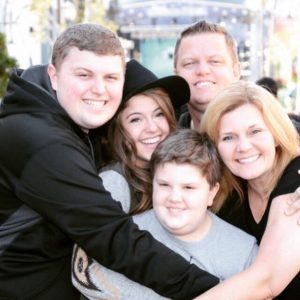
God’s Promise of Reaching People Through A Little Boy
What we found out was… we bring the DVDs home of the messages Joel would speak. Little did we know, Connor was taking the DVDs and putting them in his DVD player. What Connor said was a declaration that Joel says at the beginning of every message, and it didn’t matter if the message changed, that declaration would always be at the front end, so that’s what went over in his mind. And that became the first words he spoke.
The fact that he spoke that declaration…we knew that was God. That was kind of the beginning of when we were going to begin to not just look at our situation but begin to reach out to others. That was the birthing of Champions Club.
After he spoke that declaration, I went and spoke on a Wednesday night at Lakewood Church, and I spoke about the breakthrough, and we showed Connor. We filmed him saying, “This is my Bible…” for the first time. And our church had been walking through it; and Pastor Joel was there that day, and he’s just weeping. He walks up to me afterwards and says, “Craig.” He said, “That is amazing that Connor would speak that declaration.” He said, “Can I speak about that in a message?”
I said, “Absolutely!” So at that time, about 8 million per week were watching Pastor Joel whether through a podcast or his television broadcasts. When he spoke about Connor and showed that video, that video went viral around the world, and people started sending us messages about how Connor inspired them, how they had a special needs child, how they were going through a challenge that was overwhelming. Our son touched them, and little did I know, when God spoke to me in the car about four months before, that it would actually come to pass and millions of people would hear Connor’s testimony.
Champions Club: A Holistic Approach to Autism
So after that, I had a second conversation with God… a kind of intimate conversation with God. I was walking through Lakewood Church — and I’ll never forget this one too — and God just stopped me in front of the children’s area, and God just spoke to me said “Craig. Look at what you’re doing for typical kids. It looks like Disneyland.” He said, “But look at what you’re doing for special needs kids.” And we were like a lot of other churches, even though we were large church, we weren’t doing a lot. And God just spoke to me and said, “Craig, those kids deserve the very best just like every other child.” He said, “When you look in these kids eyes, what you’re looking at, who you’re looking at, is you’re looking at Me because when you do it unto the least of these, you do it to Me.” He says “I’m not going to let society and the church forget them any more.
We didn’t know what to do. We were still walking through it with our child. But I did know how to put together a team, and so I went down the University of Texas Medical Center and found some of the top researchers — there were two doctors that were doing some of the top research on autism and special needs. I went down to two of the most prominent special needs schools and asked a couple educators to be a part of this task force. And then I found, most importantly, special needs moms and dads who were walking through it. And for entire year, we worked on what would become the Champions Club. It’s a holistic approach: mind, body, soul, and spirit.
So there’s a physical therapy room or station. There’s a sensory station. There’s an education station. And there’s a spirit station. And the kids would rotate in between these four stations and be developed just like any other typical kid where they grow and develop. When we launched at Lakewood church, we had no idea what the response would be, but in the first six months, over 300 families came out to experience a Champions Club. It blew our mind. It was our largest growth spurt outside moving from the one building to the next building that Lakewood Church had ever had, and it was because we reached out to those kids and families.
And so as we walked through what the Champion’s Club would look like and how it would develop. We had two thoughts in mind. One, is I told them this: I said, “This program has to be so good that we never turn away any family no matter how severe their child is.” The reason why that’s important is because these families face so much rejection. So what you have in between in the Champions Club, you have equipment that works with the kids. You have training. And when we started out, we adapted a curriculum. But two years ago, Dr. Sandy Robinson I wrote the first full-scope Christian curriculum in history for special needs. It’s over 26 lessons, and it deals with behavior because you’ve got teach a lot of these kids how to respond to God and how God responds to them. Really, there wasn’t anything like this in America and definitely in the world. Now there are 60 Champions Clubs around the world. There’s one on every continent except Antarctica.
These kids have gifts. They have talents. Is it harder to bring those talents out with those kids? Yes! We’ve got work a little bit harder to bring those out, but make no mistake, it will bring them out. They can change the world.
Champion: A Story For Anyone Facing a Challenge
Connor’s been written about in five books. We just signed a contract last year with Pure Flix to do a movie based on this book Champion. And Connor just continues to be a joy and inspire people encourage people. We just couldn’t be prouder of him.
Champion is really a book that is not only for special needs parents — although they’re going to relate to our story — it’s for anybody that’s facing an overwhelming situation or challenge in their life or just trying to learn how to respond to challenges that you face in your life. And it tells a story. Little did we know when we got Connor’s diagnosis that even our worst day we might become someone else’s best hope and that God wants to use any situation, any trial, any struggle that you go through. He wants to use that for His glory and to impact other people. We could never help people with challenges today… The thing of it is, people are facing so such serious issues in their life.
“Little did we know when we got Connor’s diagnosis that even our worst day we might become someone else’s best hope and that God wants to use any situation, any trial, any struggle that you go through.” – Craig Johnson
If you look at our world today, they’re facing — whether it’s financial, whether it’s relationships, whether it’s illness, whether it’s families with special needs or medically fragile families — they’re facing overwhelming circumstances. And so Champion really tells our story of where we started and how God turned that around to help and reach millions of people that were struggling in different ways like we were. For instance, there’s a chapter in there called “Standing on the Shoulders of Giants” about when we can’t stand on our own, God will give us giants’ shoulders to stand on. And he’ll bring those people into our life to help catapult us into our destiny.
Or there’s a chapter in there called “Bend, Don’t Break.” How many times we’ve been bent by a certain circumstance, but we’ve got to be like a palm tree that pops back up. We bend, but we don’t break because we’re trusting God. We’re sitting at His feet. We’re speaking His word into our lives, and even though we bend, we’re not going to break, and we’re going to be able to stand strong and stay planted. All those things that we experienced and we walk through and how God really taught us how to speak in to those experiences, that could be for everyone. And for a special needs family, it’s going to be like a cool cup of water in the desert. They’re going to be able relate to it and know: “Man, if they can get through it, I can get through it.”
Grabbing Hold of Jesus’ Promises
About eight years ago, my wife was actually reading the Jesus Calling devotional, and me and my wife just went through a really difficult time with Connor. We were just going through so many challenges and stuff like that, and God just really worked with me on taking my devotional life — and me my wife taking our devotional life — to another level. So I began to pull together about eight different devotionals that would take maybe one to two minutes. I really believe when you’re trying to break through a barrier and when you’re trying to break through that ceiling that’s kept you down, there’s nothing more important that you can do than sit at Jesus feet because that’s where, I believe, you get God ideas. That’s where I believe that God shows you how He’s that key. When you sit at Jesus feet, that’s where you get those God ideas. That’s where you get those times that are just so deep and so strong. And I remember Jesus Calling be one of those devotionals, and I loved it because it was speaking through the Word of God because the Word of God is so powerful. But it was speaking through the Word of God like Jesus would speak to us. And that culmination was so powerful. I remember when I would do these devotionals and the Jesus Calling devotional, I would get promises, and it was exactly what I needed for that day. And what I would do is I would grab hold of that while I was going through the difficult time, and then I would write that down as a promise and put the date beside beside it. Even today, I’ve been doing this now for eight years, and even today, I go back to those promises, and I hold onto them.
And when I’m going through a difficult time, I know that God brought me through it back then, and He’ll bring us through it again. Because here’s the deal. Even though Connor has had all these miracles and all these things have happened through our story and everything, we still deal with it 24/7. We’re still walking through it, so my time with Jesus is the most important time I have every day, and I cherish it with every part of my being.
I think if I could speak to those facing a challenge right now in their lives — a major challenge in their life — I would just say this: “When you’re going through a storm, the best thing you can do when you’re going through a storm is be good to someone else.” It’s kind of like I heard our pastor share this example one time about an eagle. When an eagle is in the middle of a storm and the wind and rain are hitting it, the eagle doesn’t stay in the storm. What the eagle does is it spreads its wings as wide as it can, and all of a sudden the wind begins to lift the eagle out of that storm into where it’s peaceful and beautiful into that eye. When you’re going through a storm, when you’re good to someone else, you’re like that eagle spreading its wings. You’re going to not only rise above your storm, but you’re going to get a different perspective on your storm. That’s what Sam and I did when we were facing the most overwhelming odds. We began to be good to someone else and help someone else. What it helped us do was it helped us get a different perspective on our storm. It didn’t seem as bad as it once was, and we found out that when we reached out to the people, they began to help us. So be like an eagle. Spread your wings. Help someone else, even when you’re going through a storm and watch God take you higher.
Narrator: To find out more about Craig’s book “Champion, How One Boy’s Miraculous Journey through Autism is Changing the World”, and to learn about Champions Club, visit “championsclub.org.”
Next time on the Jesus Calling Podcast we visit with Michael Chandler, an American mixed martial artist who competes in the lightweight division. Michael talks with us about the ups and downs of his sport and how his faith in God keeps him strong.
Michael Chandler: I can’t tell you how many how many messages I get how many people come up to me face to face. How many people I meet that say Man I love the way you carry yourself. I love that you are a warrior and a fighter and you’re a savage in a cage but you’re also a man of faith and you’re also a devoted husband and devoted father. So if if I can be a husband and a father and a Christian man and have a platform to be able to reach people and then also take that platform and use it inside of a cage in front of millions of people and see how the ups and downs and the wins and losses and the pain and the anguish and the triumph of this crazy career can reach people.I mean what an awesome scenario and what a great what a great way to live out my testimony and have a platform
Today’s featured passage comes from the April 15th excerpt of the Jesus Calling audiobook:
Trust Me, and don’t be afraid. Many things feel out of control. Your routines are not running smoothly. You tend to feel more secure when your life is predictable. Let Me lead you to the rock that is higher than you and your circumstances. Take refuge in the shelter of My wings, where you are absolutely secure.
When you are shaken out of your comfortable routines, grip My hand tightly and look for growth opportunities. Instead of bemoaning the loss of your comfort, accept the challenge of something new. I lead you on from glory to glory, making you fit for My kingdom. Say yes to the ways I work in your life. Trust Me, and don’t be afraid.
Narrator: Do you love hearing great stories of faith each week via the Jesus Calling Podcast? We want to hear from you. If you haven’t already subscribed to the Jesus Calling Podcast, visit the Jesus Calling page at iTunes.com and hit the subscribe button. While you’re there, we’d love for you to leave us a review and tell us how you feel about the show and what future guests you’d love to see. Your reviews and subscription help us share these stories of faith to more people who need the hope and encouragement of Jesus Calling. If you have your own story to share, we’d love to hear from you. Visit JesusCalling.com to share your story today!
SaveSave
SaveSaveSaveSave
SaveSave



